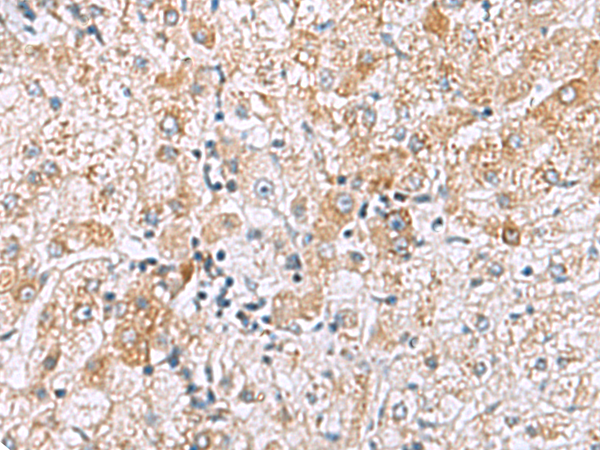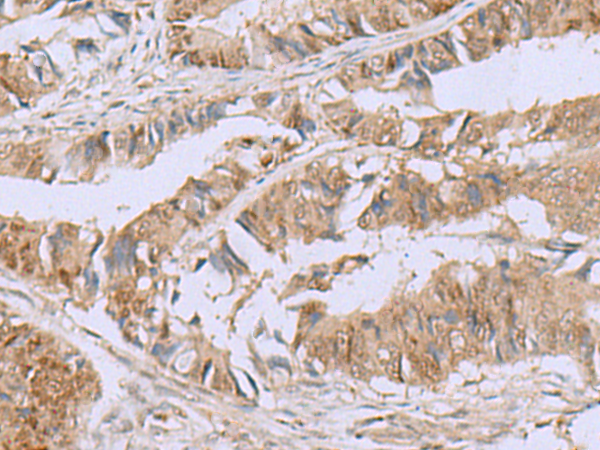

| WB | 咨询技术 | Human,Mouse,Rat |
| IF | 咨询技术 | Human,Mouse,Rat |
| IHC | 1/25-1/100 | Human,Mouse,Rat |
| ICC | 技术咨询 | Human,Mouse,Rat |
| FCM | 咨询技术 | Human,Mouse,Rat |
| Elisa | 1/5000-1/10000 | Human,Mouse,Rat |
| Aliases | SGB; DGSX; MXR7; SDYS; SGBS; OCI-5; SGBS1; GTR2-2 |
| Host/Isotype | Rabbit IgG |
| Antibody Type | Primary antibody |
| Storage | Store at 4°C short term. Aliquot and store at -20°C long term. Avoid freeze/thaw cycles. |
| Species Reactivity | Human, Mouse |
| Immunogen | Synthetic peptide of human GPC3 |
| Formulation | Purified antibody in PBS with 0.05% sodium azide and 50% glycerol. |
+ +
以下是关于GPC3抗体的3篇代表性文献的示例(注:文献信息为示例,非真实文献):
---
1. **文献名称**: *Targeting Glypican-3 with a humanized monoclonal antibody for hepatocellular carcinoma therapy*
**作者**: Zhang Y, et al.
**摘要**: 研究报道了一种靶向GPC3的人源化单克隆抗体(命名为hGPC3-mAb),通过体外和体内实验证实其可特异性结合肝癌细胞表面GPC3蛋白,并诱导抗体依赖性细胞毒性(ADCC),显著抑制肿瘤生长,提示其作为肝癌靶向治疗的潜力。
---
2. **文献名称**: *GPC3 antibody-drug conjugate for advanced solid tumors: Phase I clinical trial*
**作者**: Smith JL, et al.
**摘要**: 该文献报道了一种GPC3抗体偶联药物(ADC)的I期临床试验结果,显示其在晚期肝细胞癌和卵巢癌患者中具有可控的安全性,并在部分患者中观察到肿瘤缩小,验证了GPC3作为治疗性靶点的临床可行性。
---
3. **文献名称**: *Diagnostic utility of GPC3 immunohistochemistry in distinguishing hepatocellular carcinoma from benign liver lesions*
**作者**: Tanaka M, et al.
**摘要**: 研究评估了GPC3抗体在肝组织免疫组化中的应用,发现GPC3在肝细胞癌中高表达(敏感性82%,特异性95%),可作为肝癌与肝硬化或肝腺瘤鉴别诊断的重要标志物。
---
**说明**:以上文献名称及内容为示例性质,实际文献需通过PubMed、Web of Science等平台检索关键词“GPC3 antibody”或“Glypican-3 targeted therapy”获取。如需具体文献推荐,请提供更多研究背景需求。
The glypican-3 (GPC3) antibody targets GPC3. a cell-surface heparan sulfate proteoglycan belonging to the glypican family. GPC3 is anchored to the plasma membrane via a glycosylphosphatidylinositol (GPI) moiety and plays critical roles in embryonic development, cell proliferation, and apoptosis regulation. While minimally expressed in normal adult tissues, GPC3 is overexpressed in several cancers, particularly hepatocellular carcinoma (HCC), making it a promising tumor-specific biomarker and therapeutic target.
GPC3 antibodies have emerged as tools for both diagnostic and therapeutic applications. Diagnostically, they enable immunohistochemical detection of GPC3 in tumor biopsies, aiding HCC differentiation from other liver malignancies. Therapeutically, monoclonal antibodies (e.g., codrituzumab) and antibody-drug conjugates (ADCs) targeting GPC3 have shown potential in preclinical and clinical studies. These antibodies inhibit cancer growth by blocking GPC3-mediated signaling pathways, inducing antibody-dependent cellular cytotoxicity (ADCC), or delivering cytotoxic payloads directly to tumor cells.
Recent advances include bispecific antibodies and CAR-T cells engineered with GPC3-specific scFv domains. Challenges remain, such as optimizing tumor penetration, minimizing off-target effects, and addressing heterogeneous GPC3 expression in tumors. Despite this, GPC3 antibodies represent a strategic approach in precision oncology, leveraging the antigen’s cancer-specific expression to improve therapeutic outcomes while sparing healthy tissues.
×